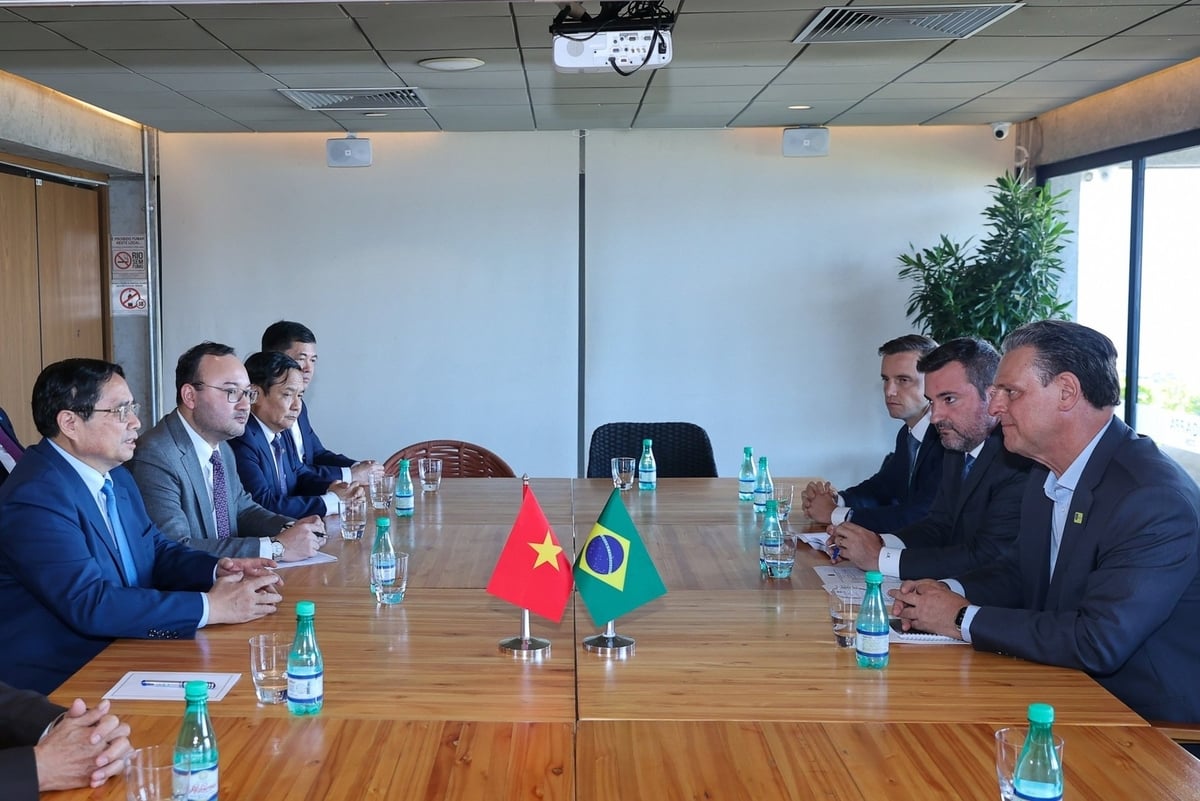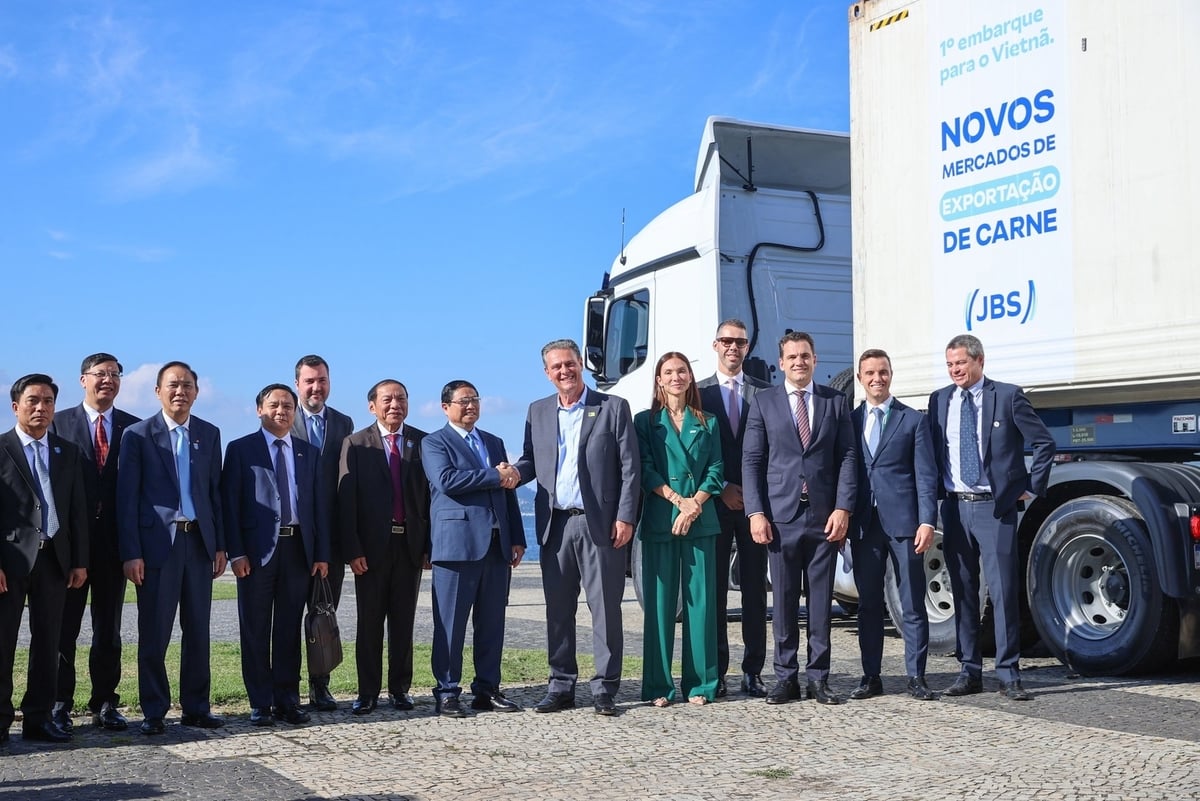October 31, 2025 | 10:28 GMT +7
October 31, 2025 | 10:28 GMT +7
Hotline: 0913.378.918
October 31, 2025 | 10:28 GMT +7
Hotline: 0913.378.918
At the meeting, Prime Minister Pham Minh Chinh affirmed that the two countries have great potential to develop agricultural cooperation, based on their large markets, complementary strengths, and the prospect of soon being connected through free trade agreements.
The Prime Minister expressed his belief that the results of this visit would open a new era of agricultural cooperation between the two countries, making agriculture a breakthrough area in bilateral relations.

Prime Minister Pham Minh Chinh meets with Brazilian Minister of Agriculture Carlos Fávaro. Photo: VGP.
The Prime Minister proposed that the two Ministries of Agriculture establish a joint task force to coordinate the implementation of high-level commitments closely. This includes further opening markets for each other’s key agricultural products, promoting local agricultural investment, establishing a partnership for coffee production and consumption, creating a joint Vietnam–Brazil coffee brand, and establishing a food security partnership under which Vietnam would supply rice to ensure food security for Brazil.
Minister Carlos Fávaro expressed deep affection for Vietnam, admiration for the ideals and vision of President Ho Chi Minh, and his honor in visiting President Ho Chi Minh’s Mausoleum during the March 2025 visit to Vietnam as part of President Lula’s delegation.
The Minister also highly appreciated Vietnam’s long-standing agricultural tradition and its growing strength in international agricultural exports. He expressed a desire to deepen bilateral agricultural cooperation, which is a pillar of the newly established Strategic Partnership.
Agreeing with the Prime Minister’s proposals, the Minister affirmed his determination to effectively implement the commitments and directions set forth by the senior leaders of both countries, transforming friendship and cooperation potential into tangible results.
The Minister expressed his readiness to exchange lists of key products with Vietnam to jointly identify a roadmap for mutual market access for agricultural goods. He also expressed a desire to connect Vietnamese and Brazilian agricultural businesses, building trade and investment partnerships based on integration and complementarity in agricultural production chains. This includes the exchange and transfer of machinery, equipment, and technologies for the production and processing of agricultural products, helping to improve both output and quality for the two countries.
Both sides agreed to urgently implement the agreed-upon steps to match the potential and expectations for agricultural cooperation and contribute to the Vietnam–Brazil Strategic Partnership. On this occasion, Prime Minister Pham Minh Chinh and Minister Carlos Fávaro witnessed the first container of Brazilian beef exported to Vietnam.

The Prime Minister and delegates at the ceremony witnessing the first container of Brazilian beef exported to Vietnam. Photo: VGP.
The Prime Minister affirmed that this event, together with the first shipment of Vietnamese pangasius, basa, and tilapia exported to Brazil during the same period, demonstrates the close, trustworthy, and mutually beneficial agricultural cooperation between the two countries. It also provides momentum for further enhanced cooperation in the future.
Previously, during the bilateral meeting between Prime Minister Pham Minh Chinh and Brazilian President Luiz Inacio Lula da Silva, the two leaders also agreed to strengthen cooperation in the coffee sector. This includes promoting the formation of a coffee production and export alliance, studying the establishment of a coffee exchange, developing a joint coffee brand, and enhancing coffee appreciation culture linked to the identities of both nations.
The two sides agreed to promote a new form of cooperation: investing in the local production and processing of agricultural goods to serve domestic markets and exports to third countries. This would leverage each country’s strengths, optimize costs, and balance mutual interests.
The two leaders agreed to direct their ministers to immediately implement the specific outcomes of the meeting, quickly translating them into practical benefits for businesses in both countries, particularly by accelerating market access for goods, agricultural products, and seafood in the context of increasingly complex global trade developments.
Brazil not only serves as the largest consumer market for Vietnamese goods in the region but also acts as a gateway for deeper penetration of Vietnamese products into neighboring South American countries through its logistics network and regional trade agreements in which Brazil participates.
Currently, in terms of trade, Brazil is Vietnam’s largest trading partner in Latin America, with impressive trade growth in recent years. In 2024, bilateral trade reached USD 7.98 billion, up 12.2% compared to 2023, with Vietnam exporting USD 2.6 billion and importing USD 5.37 billion.
Vietnam’s main exports to Brazil include phones and components, computers, electronic products and components, machinery, equipment, tools and spare parts, vehicles and parts, and various types of steel.
Vietnam mainly imports ores and other minerals, various types of cotton, animal feed and raw materials, soybeans, corn, wood and wood products, as well as raw materials for textiles, garments, and footwear.
Translated by Huong Giang

(VAN) This was the directive from Ho Chi Minh City People's Committee Chairman Nguyen Van Duoc regarding efforts to combat IUU fishing, especially ahead of an EC inspection delegation arriving in November.

(VAN) Using soil nutrient maps on mobile phones allows farmers to proactively manage field conditions and apply optimal farming practices.

(VAN) The collaboration between local agricultural extension forces and businesses is the foundation for effectively implementing the one-million-hectare high-quality, low-emission rice project.

(VAN) Minister Tran Duc Thang affirmed that the Ministry of Agriculture and Environment remains steadfast in its goal of green and sustainable development, laying the foundation for double-digit growth in the 2026-2030 period.

(VAN) Sustainable rice production requires a comprehensive soil management strategy, the application of technology, value chain linkages, and integrated economic, social, and environmental solutions.

(VAN) Kim Anh commune (Hanoi) is shifting to biosecure livestock farming to improve product quality and increase sustainable economic value.

(VAN) Early on October 30, all relief supplies from the Russian Federation arrived at Noi Bai Airport and immediately transported to Hue City during its peak of the flooding.